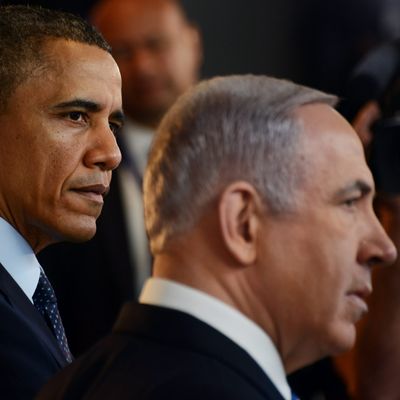
It is strange that an election that merely extended the status quo would be historically transformative, but that may be the case with Benjamin Netanyahu’s triumph in Israel. The catalytic event is not so much Netanyahu’s victory but his racist pre-election rants against Arab voting (which was, historically, a point of Zionist pride) and, even more so, his categorical rejection of any two-state solution during his tenure. A fundamental alteration of the American alliance with Israel may be inevitable. There are signs it is already underway.
Obviously, Republicans have responded to Netanyahu’s triumph with unadulterated joy. The political success of a right-wing government tightly allied with their party gives them a vicarious victory over Obama, against whom they have raged ineffectually in the U.S. The more telling response is the equal outpouring of joy and relief from the anti-Israel left. “Netanyahu’s Win Is Good for Palestine,” writes Yousef Munayyer in a New York Times op-ed today. As Munayyer has written more explicitly elsewhere, he believes in the “one-state solution” that would eliminate Israel altogether as a Jewish homeland. Likewise, the Electronic Intifada’s Ali Abunimah exults in Netanyahu’s reelection, which forestalled the possibility of a moderate Israeli government that “would have attempted to draw Palestinians back into ‘negotiations’ over what would at most be a ghetto-like bantustan designed to legitimize Israel’s theft of vast tracts of land, its annexation of Jerusalem and its abrogation of the rights of Palestinian refugees.” Partition is Abunimah’s greatest fear. Maintaining singular control of the territory will allow its eventual Arab majority to dominate it.
And so the advocates of the one-state solution on the right and the left find themselves in curious agreement. The former believe that Israel can maintain military control over the West Bank and Gaza without giving political rights to Palestinians forever. (Mike Huckabee happily endorses Netanyahu’s abandonment of partition.) The latter believe, more realistically, that this will lead to Israel’s isolation and eventual collapse. Both sides see Netanyahu as the ideal short-term vehicle for their long-term vision.
Netanyahu is expected to walk back his denunciation of the two-state solution, which he made in unequivocal terms. Here Netanyahu is reprising tactics employed for years by Yasser Arafat, who would issue maximal demands in Arabic and follow them with conciliatory remarks to the foreign press. Netanyahu may be best understood as Israel’s Arafat — a master of nationalist politics, yet also disastrously lacking any strategic vision, and able to survive only at the deep and possibly fatal cost to his own people’s long-term aspirations.
The dilemma now rests on those who advocate separate Jewish and Palestinian states, including the Obama administration. Helen Cooper and Michael Shear report that the administration may abandon its longtime veto of a United Nations resolution calling for a two-state solution based on 1967 borders and land swaps. Michael Crowley quotes a senior Obama administration official suggesting a broader change to the diplomatic relationship: “We are signaling that if the Israeli government’s position is no longer to pursue a Palestinian state, we’re going to have to broaden the spectrum of options we pursue going forward.”
To what extent the administration immediately follows through on this threat remains to be seen. What seems more clear is that American Israel policy, which for decades has born almost no meaningful differences between the parties, is destined to cleave along two tracks. In part, this reflects the broader trend for polarization to bifurcate everything else in American politics. It also specifically reflects the increasingly irreconcilable visions of the conservative and the liberal Zionists.
The conservative one-staters have a nationalist vision for Israel’s future that makes no provision whatsoever for the political rights of Arabs. They are accordingly refashioning Israel’s alliance with the United States into an alliance with the Republican Party. Just as American conservatives supported an American alliance with an otherwise isolated South Africa through the 1980s, this movement would maintain unconditional support for Israel as a garrison state. (This alliance did not last much beyond the 1980s for South Africa, but they devote little attention to long-term strategy.)
The liberal two-staters need to create a different strategy. Likely, they will keep in place the military component of the alliance. The Obama administration’s support for Iron Dome saved innumerable Israeli lives and contained the scope and duration of the last intifada. American military aid to Israel has prevented the general inter-state wars that used to break out periodically. That should continue for the foreseeable future, and is likely to. (Even if Democrats were to abandon this policy, Republican domination of Congress would probably perpetuate it anyway.)
The diplomatic relationship will face a day of reckoning. Liberals have a deep (and, in my opinion, correct) attachment to Israel’s founding ideals as a democratic haven for the Jewish people. They will have to adjust to a reality that is leaving them behind.






























